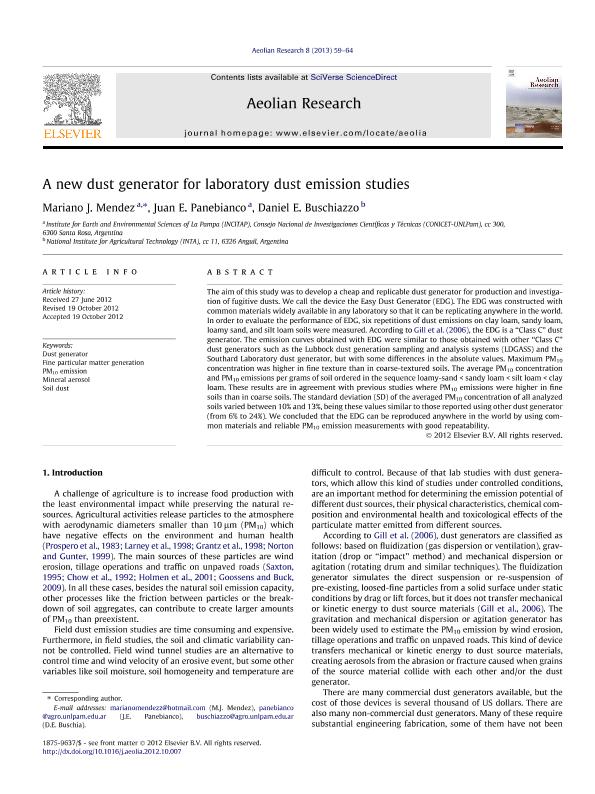Mostrar el registro sencillo del ítem
dc.contributor.author
Mendez, Mariano Javier

dc.contributor.author
Panebianco, Juan Esteban

dc.contributor.author
Buschiazzo, Daniel Eduardo

dc.date.available
2017-06-29T19:26:29Z
dc.date.issued
2013-03
dc.identifier.citation
Mendez, Mariano Javier; Panebianco, Juan Esteban; Buschiazzo, Daniel Eduardo; A new dust generator for laboratory dust emission studies; Elsevier Science; Aeolian Research; 8; 3-2013; 59-64
dc.identifier.issn
1875-9637
dc.identifier.uri
http://hdl.handle.net/11336/19179
dc.description.abstract
The aim of this study was to develop a cheap and replicable dust generator for production and investigation of fugitive dusts. We call the device the Easy Dust Generator (EDG). The EDG was constructed with common materials widely available in any laboratory so that it can be replicating anywhere in the world. In order to evaluate the performance of EDG, six repetitions of dust emissions on clay loam, sandy loam, loamy sand, and silt loam soils were measured. According to Gill et al. (2006), the EDG is a “Class C” dust generator. The emission curves obtained with EDG were similar to those obtained with other “Class C” dust generators such as the Lubbock dust generation sampling and analysis systems (LDGASS) and the Southard Laboratory dust generator, but with some differences in the absolute values. Maximum PM10 concentration was higher in fine texture than in coarse-textured soils. The average PM10 concentration and PM10 emissions per grams of soil ordered in the sequence loamy-sand < sandy loam < silt loam < clay loam. These results are in agreement with previous studies where PM10 emissions were higher in fine soils than in coarse soils. The standard deviation (SD) of the averaged PM10 concentration of all analyzed soils varied between 10% and 13%, being these values similar to those reported using other dust generator (from 6% to 24%). We concluded that the EDG can be reproduced anywhere in the world by using common materials and reliable PM10 emission measurements with good repeatability.
dc.format
application/pdf
dc.language.iso
eng
dc.publisher
Elsevier Science

dc.rights
info:eu-repo/semantics/openAccess
dc.rights.uri
https://creativecommons.org/licenses/by-nc-sa/2.5/ar/
dc.subject
Dust Generator Emission
dc.subject
Fine Particular Matter Generation
dc.subject
Pm10
dc.subject
Mineral Aerosol
dc.subject
Soil Dust
dc.subject.classification
Ciencias del Suelo

dc.subject.classification
Agricultura, Silvicultura y Pesca

dc.subject.classification
CIENCIAS AGRÍCOLAS

dc.title
A new dust generator for laboratory dust emission studies
dc.type
info:eu-repo/semantics/article
dc.type
info:ar-repo/semantics/artículo
dc.type
info:eu-repo/semantics/publishedVersion
dc.date.updated
2017-06-29T13:57:41Z
dc.journal.volume
8
dc.journal.pagination
59-64
dc.journal.pais
Países Bajos

dc.journal.ciudad
Ámsterdam
dc.description.fil
Fil: Mendez, Mariano Javier. Consejo Nacional de Investigaciones Científicas y Técnicas. Instituto de Ciencias de la Tierra y Ambientales de La Pampa. Universidad Nacional de La Pampa. Facultad de Ciencias Exactas y Naturales. Instituto de Ciencias de la Tierra y Ambientales de La Pampa; Argentina
dc.description.fil
Fil: Panebianco, Juan Esteban. Consejo Nacional de Investigaciones Científicas y Técnicas. Instituto de Ciencias de la Tierra y Ambientales de La Pampa. Universidad Nacional de La Pampa. Facultad de Ciencias Exactas y Naturales. Instituto de Ciencias de la Tierra y Ambientales de La Pampa; Argentina
dc.description.fil
Fil: Buschiazzo, Daniel Eduardo. Instituto Nacional de Tecnología Agropecuaria. Centro Regional La Pampa-San Luis. Estación Experimental Agropecuaria Anguil; Argentina. Consejo Nacional de Investigaciones Científicas y Técnicas; Argentina
dc.journal.title
Aeolian Research
dc.relation.alternativeid
info:eu-repo/semantics/altIdentifier/doi/http://dx.doi.org/10.1016/j.aeolia.2012.10.007
dc.relation.alternativeid
info:eu-repo/semantics/altIdentifier/url/http://www.sciencedirect.com/science/article/pii/S1875963712000651
Archivos asociados
